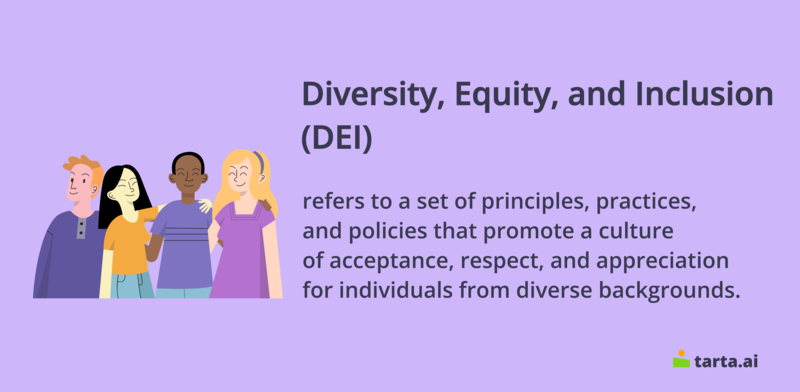Creating a More Inclusive and Diverse Workplace: Understanding Diversity, Equity, and Inclusion (DEI) and Its Importance

Diversity, Equity, and Inclusion (DEI) programs have become increasingly prevalent in organizations worldwide, as a response to the need for a more diverse and inclusive workplace environment. DEI initiatives focus on creating a culture that is accepting, respectful, and inclusive of individuals from diverse backgrounds.
DEI programs aim to increase diversity within the workforce, promote equity by addressing inequalities and promoting fair opportunities, and foster a culture of inclusion where everyone feels valued, respected, and appreciated. Organizations recognize that by investing in DEI programs, they not only benefit their employees but also positively impact their business outcomes.
Companies with above-average diversity produced a greater proportion of revenue from innovation (45% of total) than from companies with below average diversity (26%). (Forbes)
Diversity, Equity, and Inclusion
Diversity encompasses all aspects of differences among individuals, such as race, ethnicity, gender, age, religion, sexual orientation, and physical abilities. By embracing diversity, organizations can gain new perspectives, enhance creativity and innovation, and better understand and serve their diverse customer base.
Equity is about treating individuals fairly and providing equal opportunities for all. This means addressing systemic and institutional barriers that prevent individuals from underrepresented groups from accessing the same opportunities and resources as their peers.
Inclusion is about creating a sense of belonging where individuals feel accepted, valued, and respected for who they are. Organizations need to foster an inclusive culture that encourages diverse perspectives and experiences, promotes collaboration, and recognizes the unique contributions of each individual.
DEI Programs Initiatives
DEI programs include a wide range of initiatives aimed at creating a more inclusive and diverse workplace environment. Here are some examples:
Recruitment and retention strategies
Organizations may implement targeted recruitment strategies to attract candidates from diverse backgrounds. These strategies may involve partnering with community organizations, participating in diversity job fairs, and using job postings that specifically target underrepresented groups. Retention strategies may include providing mentorship and professional development opportunities for employees from underrepresented groups.
Training programs
Organizations may provide training to their employees on topics related to diversity, equity, and inclusion. This training may cover topics such as unconscious bias, cultural awareness, and how to create an inclusive workplace environment. The goal of these training programs is to increase awareness and understanding of diversity and inclusion among employees.
Employee resource groups
Employee resource groups (ERGs) provide a platform for employees from underrepresented groups to come together, share their experiences, and advocate for their needs. ERGs may be organized around common identities, such as race or gender, or around shared interests or experiences, such as working parents or employees with disabilities.
Metrics and accountability measures
Organizations may use metrics and accountability measures to track progress and identify areas for improvement in their DEI efforts. For example, organizations may set goals around increasing the representation of underrepresented groups in leadership positions or track employee engagement and satisfaction among employees from underrepresented groups.
Continuous Evaluation and Improvement
Implementing DEI programs is only the first step towards creating a more inclusive and diverse workplace. It's important for organizations to continuously evaluate their efforts to ensure that their DEI initiatives are effective and making a positive impact. Here are some ways that organizations can do this:
- Regular assessments of workplace culture: Organizations should regularly assess their workplace culture to identify areas where improvements can be made. This may involve conducting surveys or focus groups to gather feedback from employees, as well as analyzing data on diversity, equity, and inclusion within the organization.
- Continuous training and education: DEI training should be an ongoing process, rather than a one-time event. Organizations should provide regular training and education on topics related to diversity, equity, and inclusion to ensure that employees have the skills and knowledge they need to create an inclusive workplace environment.
- Commitment to ongoing improvement: Organizations should be committed to continuously improving their DEI efforts. This may involve setting goals and targets for increasing diversity and inclusion within the organization, as well as regularly reviewing progress and making adjustments as needed.
In addition, it's important for organizations to have a clear understanding of the business case for DEI. By promoting diversity, equity, and inclusion within the workplace, organizations can benefit from increased creativity, innovation, and problem-solving, as well as improved employee engagement and retention.
- Diversity, Equity, and Inclusion (DEI) programs aim to create a culture that is accepting, respectful, and inclusive of individuals from diverse backgrounds.
- DEI initiatives include recruitment and retention strategies, training programs, employee resource groups, and metrics and accountability measures.
- Organizations should continuously evaluate their DEI efforts to ensure that they are effective and making a positive impact. This includes regular assessments of workplace culture, continuous training and education, and a commitment to ongoing improvement.
- Promoting diversity, equity, and inclusion within the workplace can lead to increased creativity, innovation, and problem-solving, as well as improved employee engagement and retention.
FAQ
What is Diversity, Equity, and Inclusion (DEI)?
Diversity, Equity, and Inclusion (DEI) refers to initiatives and programs aimed at creating a more diverse and inclusive workplace environment where all individuals feel valued, respected, and appreciated.
Why is DEI important in the workplace?
DEI is important in the workplace because it promotes fairness, equality, and respect for all individuals regardless of their background, experiences, or identities.
What are some examples of DEI initiatives?
DEI initiatives include recruitment and retention strategies that aim to increase diversity within the workforce, training programs that promote awareness and understanding of diversity and inclusion.
What are some benefits of implementing DEI programs?
Increased creativity, innovation, and problem-solving, improved employee engagement and retention, and a better understanding and connection with diverse customer bases.
How can individuals support DEI efforts in the workplace?
Individuals can support DEI efforts in the workplace by educating themselves on DEI topics, participating in DEI training and initiatives, and advocating for diversity and inclusion in their daily interactions and decision-making processes.